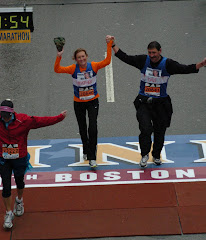The affect of age on running is like the affect of age on a fine cheese….eventually it just stinks. Getting past the initial aches and pains of the first few miles is like getting that stinky cheese past your nose…if you want to taste the good feeling you have to get through the stinky stuff first. As I get older it seems to take more than a few miles to get past the “stinky stuff.”
Don’t get me wrong, I like running (and cheese), I just don’t like what getting old does to my running. But for all the moaning and groaning about the aches and pains of being an age-challenged runner (it’s not polite to say “old” anymore) I wouldn’t trade being on the roads for any other form of exercise. For me, being a “geezer wheezer “ is just fine.
What does piss me off is being injured. It’s hard enough getting up at 5 AM on cold winter mornings to slog through a couple of hours of below-freezing running in the dark. But to do it limping from a sore hamstring or a painful knee, well let’s just say it’s certainly not the fun part.
So why do it? I could point to a recent article by Owen Andersen on the benefits of running to people over 60. Owen refers to a series of studies on the affects including the following:
What other things did mum forget to tell you about running? Well, she probably didn't mention that once you reach the age of 60, your HDL should rise by about 1.5 ticks for each additional 10 kilometres of running that you complete per week. Plus, for each 10 kilometres, your waist circumference will narrow by one centimetre, your hip circumference will do the same, your diastolic blood pressure will dive by .4 mm Hg, resting heart rate will go down by .6 beats, and blood-fat levels will decrease by 3.3 mg/dL. (Full article at http://www.pponline.co.uk/encyc/running-training-how-to-improve-your-economy-and-efficiency-691 )
It could also be that I’m just addicted. After 40+ years of running, I’m a street-pounding junkie. There’s a study on the Live Science web site that suggests that the endorphins released in runners become addictive over time. The study used rats to prove the point, and while I prefer not to be equated to rodents, my wife would certainly argue that when you take away my running the response can certainly resemble the negative aspects of withdrawal.
But the real reason I run marathons is because it’s my reminder that I’m blessed to have the ability and time to do it and I can use that gift to give back to the people who do not. It’s also a way for me to keep my son’s memory alive by dedicating the effort to the charity in his name, “Help in the Nick of time.” I’ll concede I like the health effects of running and there is no question there is a certain “high” to being fit, but before I started running for charities I only ran 1 marathon in 10 years. In the last 6 years I have done 9 and we have raised over $30,000 to help others.
I love win-win scenarios…I get the running benefits, the people we help get hope and assistance, and I get to do something that celebrates my son’s memory. Age be damned, what more can you ask for?


No comments:
Post a Comment